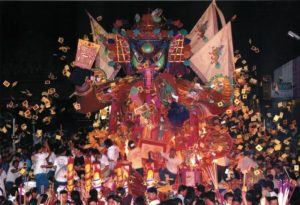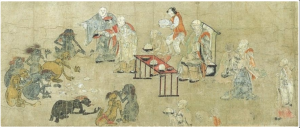中元節[鬼節]
Hungry Ghost Festival
_____________________________________

Traditionally the Hungry Ghost [1] Festival is held on the 15th day of the 7th lunar month [2]. It is a day of festivities for both Daoists and Buddhists. It marks the day when the portal to the underworlds open and the living are visited by the Spirits and Ghosts of the lower realms. The common people during that time attempt to appease the ghostly visitors with large feasts of food, burning incense, joss paper, clothes and so on. This goes as far as performing opera with the front rows empty for the ghost to sit on. Other customs may include the guiding of the hungry ghost back to their lower realms by releasing lotus lantern on water. Without compliance to these customs a family household would risk bad luck and misfortune, as the ghosts are considered to be one’s own ancestors and forefathers would died of un-natural causes or were never given a proper burial ritual.
Furthermore, family households also make offerings to the unknown wandering ghosts to prevent them from intruding into their lives and wreaking havoc.
The Hungry Ghost festival arguably originated from the Buddhist Ullambana Sutra [yu lan pen jing盂兰盆经] of the Mahayana tradition and as time went on entered into Daoist rituals. The story goes as follows:
聞如是: 一時佛在舍衛國祇樹給孤獨園。大目乾連始得六通,欲度父母,報乳哺之恩。即以道眼觀視世間,見其亡母生餓鬼中,不見飲食,皮骨連立。目連悲哀,即缽盛飯,往餉其母。母得缽飯,便以左手障飯,右手摶飯。食未入口,化成火炭,遂不得食。目連大叫,悲號啼泣,馳還白佛,具陳如此。
佛言:“汝母罪根深結,非汝一人力所奈何!汝雖孝順,聲動天地,天神、地神、邪魔、外道、道士、四天王神亦不能奈何!當須十方眾僧威神之力乃得解脫。吾今當為汝說救濟之法,令一切難皆離憂苦,罪障消除。”
佛告目連:“十方眾僧於七月十五日僧自恣時,當為七世父母及現在父母厄難中者,具飯、百味五果、汲灌盆器、香油錠燭、床敷臥具、盡世甘美以著盆中,供養十方大德眾僧。
[One] heard that at the time when Buddha was in Sravasti ‘s [3] Jetavana-vihāra [4]. Maudgalyayana [5] commenced to obtain the Six Communions [6]-six transcendental powers- [he] desired to deliver [his] father and mother, in recompense for breastfed and nursed. At once [he] observed and viewed the world by the use of the eyes of the Dao [and] saw that his deceased mother had been born amongst the hungry ghosts. She was not meeting with any drink or food, [therefore] skin and bones joined to establish [her]. Maudgalyayana was sorrowful and mournful, [thus] immediately filled a monk’s alms bowl with cooked  rice, [and] directed [it] towards his mother as ration. [When] his mother obtained the monk’s alms bowl, [she] then shielded the cooked rice with her left hand, and rolled it into rice balls with her right. The food had not yet entered [her] mouth, [when] it transformed into burning coals, thereupon [she] was unable to feed [on it]. Maudgalyayana screamed loudly, roaring in sorrow, crying and weeping aloud. He stormed back to ask the Buddha.
rice, [and] directed [it] towards his mother as ration. [When] his mother obtained the monk’s alms bowl, [she] then shielded the cooked rice with her left hand, and rolled it into rice balls with her right. The food had not yet entered [her] mouth, [when] it transformed into burning coals, thereupon [she] was unable to feed [on it]. Maudgalyayana screamed loudly, roaring in sorrow, crying and weeping aloud. He stormed back to ask the Buddha.
The Buddha said: The fetters of the root of your mother’s wrongdoings [run] deep, [that is why] it is not something which can be dealt with by you – a single person’s strength and power. Although the sound of your respect for your parents can touch Heaven & Earth, even the Heavenly Spirits, the Earthly Spirits, the evil ghosts, the crooked Dao, the Daoist and the Royal Spirits of the Four Heavens [7] are unable to be of any avail. [You] ought to need the multitudes of monks of the Ten Directions acting as Spirit strength, thus, [you will] obtain dissolution and shedding [of her fetters]. Today, I ought to talk to you about the Dharma of rescuing the ones in need, to cause everyone in hardship depart from worries and suffering and to eliminate the obstacles from wrongdoings.
The Buddha told Maudgalyayana: On the 15th day of the 7th lunar month at the time of the Paravana [8] the multitudes of Sanghas of the Ten Directions ought to act [on behalf of] the seven generations of fathers and mothers as well as the current fathers and mothers’ [who are] amidst distress and difficulty, [and] provide food [of] hundred flavors and five fruits, pour [them] into basins as utensils, incense, oils, ingots and candles, bed covers and bedding, exhausting the world’s sweet beauty in order to display them within basins and containers. [By doing so one] makes offering in the Ten Directions [to] the great and virtuous multitudes of the sanghas.
______________________________________________

[1] Hungry Ghosts are not to be mistaken with the generic term for ghosts. Hungry Ghosts are special as they are generated in very disastrous circumstances such as a family killing or the absolute absence of veneration by the descendants.
[2] This date will vary in the Gregorian solar calendar according to the shifts of the beginning of Chinese New Year.
[3] City of ancient India
[4] Vihara is a Sanskrit word for a Buddhist monastery. Jetavan-vihara is considered one of the most famous ones in India which is located in present-day Uttar Pradesh. It was donated to the Buddha by Suddhata.
[5] Maudgalyāyana, or Mahāmaudgalyāyana, was one of the Buddha’s closest disciples.
[6] The Six Communions are, first, the Spirit-Ampleness-Communion [shen zu tong 神足通including special higher powers such as walking on water, second, the Heavenly-Ear-Communion [tian er tong天耳通], which is clair-audience, third, the Other‘s-Heart-Mind Communion [tax in tong 天耳通), that is, clair-audience; fourth, the Karmic-Destiny- Communion [su ming tong宿命通], encompassing the memory of one’s past lives, fifth, the Heavenly-Eye-Communion [tian yan天眼通] having awareness of one’s karma, and, lastly, fifth, the Revealing-the-Utmost-Communion [lou jin tong漏盡通), after which one consequently becomes an arhat.
[7] They are also called the Four Great Heavenly Kings [si da tian wang四大天王], Spirits to safeguard the Four Directions, namely Vaisravana, who hear everything, in the North, Virudhaka, who cause to grow, in the South Dhrtarastra, who upholds the realm, in the East and lastly Virūpāksa, who sees all, in the West.
[8] Paravana is a Buddhist holiday during which each monk mus stand in front of the sangha and atone for their wrongdoings committed during the three-month annual retreat, known as Vassa.
______________________________________________
